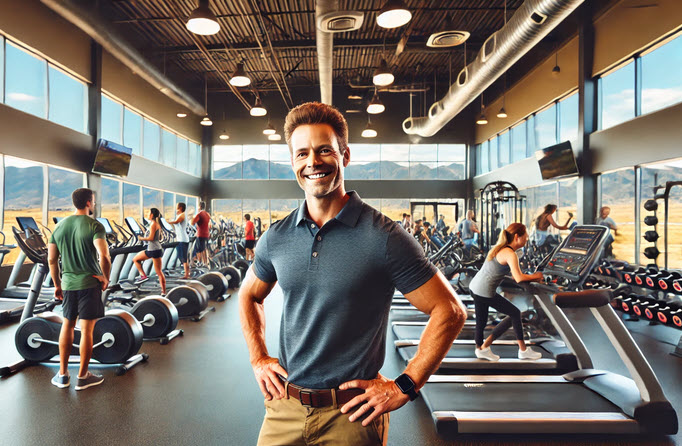As 2025 approaches, fitness facilities across Colorado are gearing up for one of the busiest and most profitable times of the year. January, a high-traffic month for gyms and wellness centers, is expected to see a surge in memberships as thousands of Coloradans commit to their New Year’s fitness resolutions. According to industry reports, gym memberships in January typically spike by 12-15% nationwide, and Colorado’s active population often outpaces these trends.
In 2024 alone, over 1.5 million people joined gyms in the United States during January. Colorado, home to approximately 2,250 fitness-related facilities, including gyms, yoga studios, martial arts schools, and boutique fitness centers, continues to lead the charge in promoting health and wellness. The state’s diverse offerings, ranging from cutting-edge climbing gyms to serene yoga studios, ensure that fitness enthusiasts have access to experiences tailored to their goals.
Hard data from the International Health, Racquet & Sportsclub Association (IHRSA) shows that January accounts for 10% of annual gym membership sales nationwide. Colorado, consistently ranked among the top 10 healthiest states in the U.S., sees even higher growth in January due to its wellness-oriented culture. Boutique fitness studios are thriving, with IBISWorld reporting 4.8% annual growth over the past five years, driven by demand for personalized and community-focused workouts. Yoga, Pilates, martial arts, and hybrid models combining in-person and virtual classes are particularly popular among Coloradans.
This surge in demand brings exciting opportunities to expand services and boost revenue—but it also increases the risks of accidents, claims, and other liabilities. Fitness business owners must prepare not only to attract new members but also to safeguard their facilities, staff, and clients. Adopting proactive risk management strategies and securing comprehensive insurance coverage is essential to capitalize on this momentum while staying protected.
By preparing now, fitness businesses can make the most of Colorado’s booming health and wellness culture, ensuring success and protection during this critical period.
The Need for Comprehensive Insurance
Every fitness business faces distinct challenges and risks that require specialized insurance solutions. General liability coverage alone often isn’t enough to address the unique liabilities associated with the fitness industry. For example, the high-intensity nature of group classes or the technical demands of rock climbing can increase the likelihood of injuries, while retail components like fitness equipment sales introduce additional risks.
Castle Rock Insurance specializes in providing tailored coverage for Colorado’s fitness businesses, offering peace of mind and financial security. Their wide range of solutions includes:
- Fitness Gym Liability Insurance: Protects gyms from on-site injuries, equipment accidents, and property damage claims, ensuring you’re covered for common risks.
- Yoga Studio Insurance: Specifically designed for yoga businesses, this policy covers participant injuries, property damage, and professional liability.
- Martial Arts Studio Insurance: Offers coverage tailored to martial arts schools, addressing risks like training injuries and equipment damage.
- Personal Trainer Liability Insurance: Protects individual trainers from claims of negligence, injury, or damages resulting from training sessions.
- Rock Climbing Gym Insurance: Covers high-risk activities, including participant injuries, equipment failure, and property damage specific to climbing gyms.
- Fitness Equipment Store Insurance: Protects fitness retailers from risks like theft, inventory damage, and liability related to product defects or sales.
- Vitamin & Supplement Store Insurance: Provides coverage for vitamin and supplement stores against risks such as theft, inventory damage, and liability stemming from product defects or sales-related issues.
- Bicycle Repair Shop Insurance: Tailored for bike shops, this coverage protects against liability claims from customer injuries, property damage, and risks like theft or inventory loss.
- Running Store Insurance: Designed for running shops, this policy covers inventory protection, liability for customer injuries, and potential risks from product sales or events.
By addressing the unique risks associated with your fitness business, these tailored policies help you focus on growth while reducing financial vulnerabilities.
Assess Your Coverage Needs
The first step in preparing your fitness business for 2025 is to take a close look at your current insurance policies. Start by reviewing the specific activities your business engages in, such as group fitness classes, personal training sessions, or retail sales of fitness equipment and merchandise. Each of these areas presents unique risks that require tailored coverage.
For example, if you run group fitness classes, you’ll need liability insurance that covers potential injuries sustained during high-intensity workouts or classes involving specialized equipment like weights or resistance bands. Personal trainers, on the other hand, face risks related to professional liability, such as claims of improper guidance or injury during one-on-one sessions. Similarly, if your business includes a retail component, property insurance is crucial to protect against theft, inventory loss, or damage to your store.
Gaps in protection can leave your business vulnerable to costly claims, so it’s important to ask critical questions:
- Does your policy cover injuries caused by faulty equipment?
- Are high-risk activities like martial arts or rock climbing properly insured?
- Do you have sufficient protection for natural disasters, such as Colorado’s frequent hailstorms or wildfire risks?
By thoroughly evaluating your existing policies, you can identify areas where additional coverage may be necessary. Consulting with an insurance expert can help you address these gaps, ensuring your fitness business is fully protected for the year ahead. Investing time in this process now can save you from financial stress and legal complications in the future.
Adopt Risk Management Practices
Taking proactive steps to reduce potential liabilities is a critical part of preparing your fitness business for 2025. While comprehensive insurance coverage protects your business financially, adopting effective risk management practices minimizes the likelihood of accidents or claims, creating a safer environment for your staff and clients. Here are key strategies to implement:
1. Regularly Maintain and Inspect Gym Equipment
Faulty or poorly maintained equipment is a leading cause of injuries in fitness facilities. Establish a strict maintenance schedule for all equipment, including treadmills, weights, resistance machines, and climbing gear. Document inspections and repairs to ensure compliance with safety standards and provide evidence of due diligence in case of claims. Replace worn-out or outdated equipment promptly to reduce risks and maintain client trust.
2. Train Staff on Proper Safety Protocols
Your staff is your first line of defense against accidents. Provide thorough training on safety procedures, including spotting techniques, proper equipment usage, and emergency response protocols. Empower employees to recognize and address potential hazards, such as loose cables or slippery floors, before they become issues. Regular refresher courses help ensure that safety knowledge is up-to-date and consistently applied.
3. Require Signed Liability Waivers for High-Risk Activities
If your business offers high-risk activities like martial arts, rock climbing, or advanced fitness classes, liability waivers are essential. These documents inform clients of potential risks and protect your business from legal claims in the event of an injury. Work with a legal professional to draft waivers that comply with Colorado laws and clearly outline the risks associated with specific activities. Ensure waivers are signed and securely stored for easy reference.
4. Use Security Systems to Protect Your Facility and Assets
Invest in security measures to safeguard your business from theft, vandalism, and unauthorized access. Install surveillance cameras in key areas, such as entrances, exits, and equipment storage rooms. Use alarm systems and access control features like keycards or PIN codes to monitor who enters and exits your facility. These measures not only deter criminal activity but can also lower insurance premiums by demonstrating proactive risk management.
5. Maintain Cleanliness and Hygiene Standards
In the wake of heightened awareness about public health, cleanliness is more important than ever. Implement a rigorous cleaning schedule to sanitize equipment, floors, and high-touch surfaces. Provide ample hand sanitizing stations and encourage members to clean equipment after use. A clean and hygienic facility not only reduces the risk of illness but also fosters a positive reputation among clients.
6. Monitor and Enforce Capacity Limits
Overcrowding increases the risk of accidents and injuries. Use booking systems to manage class sizes and gym capacity, ensuring clients have adequate space to exercise safely. During peak times, consider additional staff on hand to monitor member activity and prevent overcrowding in high-traffic areas.
By implementing these risk management practices, you not only create a safer and more welcoming environment but also demonstrate your commitment to the well-being of your clients and staff. Proactive measures can also reduce your insurance premiums, saving money while protecting your business.
Expand Your Offerings
Expanding your fitness business’s offerings is one of the most effective ways to stay competitive in Colorado’s thriving wellness market. As consumer preferences continue to evolve, diversifying your services ensures you can attract and retain a broader audience while boosting revenue streams. Here are some strategies and trending areas to consider as you grow your offerings:
1. Introduce Hybrid Membership Models
Hybrid memberships that combine in-person access with virtual classes are becoming the gold standard in the fitness industry. Many clients value the flexibility of working out at home while still having access to the community and equipment of a physical gym.
- Offer live-streamed classes, recorded sessions, or exclusive content that members can access on-demand.
- Use fitness apps to provide personalized workout plans, progress tracking, and communication with trainers.
- Market hybrid memberships as a cost-effective option for busy clients or those who prefer variety in their workout routines.
2. Add Virtual Fitness Classes
Virtual fitness classes gained momentum during the pandemic and continue to be a strong draw for tech-savvy clients. Consider expanding your virtual class offerings to include a variety of formats, such as yoga, Pilates, strength training, or cardio.
- Invest in high-quality audio and video equipment to provide a seamless virtual experience.
- Hire skilled instructors who can engage participants effectively, even through a screen.
- Create tiered pricing structures for virtual-only memberships or bundled access with in-person classes.
3. Tap Into Niche Fitness Markets
Specialized fitness programs attract dedicated communities and can set your business apart from competitors. Consider adding services like:
- Pilates: Known for its focus on core strength and flexibility, Pilates appeals to individuals looking for low-impact workouts. Offer mat classes or invest in reformer machines to elevate the experience.
- Martial Arts: Karate, jiu-jitsu, or kickboxing classes cater to both adults and children, creating a family-friendly atmosphere. Martial arts training also doubles as self-defense education, broadening its appeal.
- Senior Fitness: As Colorado’s population ages, senior-specific programs focusing on mobility, balance, and strength can attract older clients looking to maintain an active lifestyle.
- Recovery and Wellness Services: Add features like foam rolling workshops, cryotherapy, or massage therapy to address post-workout recovery needs.
4. Launch Specialty Group Classes
Group fitness classes foster a sense of community, which is a major draw for clients. Expand your schedule to include specialty classes that stand out:
- High-intensity interval training (HIIT) classes for those seeking fast-paced, calorie-burning workouts.
- Dance-based workouts like Zumba or barre for clients who enjoy creative and fun exercise formats.
- Seasonal outdoor classes, such as boot camps or yoga in the park, to take advantage of Colorado’s scenic environment.
By expanding your services and exploring trending areas, you can position your fitness business for sustained growth and community engagement.
5. Offer Personalized Training Programs
Personalized services, like one-on-one training or small group sessions, appeal to clients who want tailored experiences. Invest in technology like wearable fitness trackers or apps that can customize plans based on individual goals, such as weight loss, muscle building, or improved endurance. Personalized programs not only cater to specific client needs but also foster stronger loyalty by demonstrating your commitment to their progress.
6. Expand Retail Options
Fitness retail offers an additional revenue stream and enhances the overall client experience. Selling branded merchandise, nutritional supplements, or fitness equipment allows members to connect with your brand while meeting their fitness needs. Popular items include:
- Branded apparel like T-shirts, hoodies, and leggings.
- Reusable water bottles, gym towels, and yoga mats.
- Recovery tools such as foam rollers, massage guns, and resistance bands.
- Nutrition products, including protein powders, energy bars, and vitamins.
Retail items also serve as marketing tools, as branded merchandise can increase your gym’s visibility when used outside the facility.
7. Develop Workshops and Events
Workshops and events can help you attract new members and offer added value to your current clientele. Examples include:
- Nutrition Workshops: Partner with a registered dietitian to provide education on meal planning and healthy eating habits.
- Skill-Specific Classes: Host short-term programs like “Learn to Lift” or “Beginner Yoga” to build foundational skills for new members.
- Wellness Retreats: Organize fitness-focused getaways, such as weekend boot camps or yoga retreats in Colorado’s scenic mountain areas.
These events not only generate additional income but also foster community and engagement within your client base.
8. Cater to Corporate Clients
With many companies prioritizing employee wellness, offering corporate fitness packages can open a lucrative revenue stream. Partner with local businesses to provide group memberships, team-building classes, or workplace wellness seminars. Corporate clients often appreciate the convenience of tailored programs that improve employee health and productivity, making it a win-win for both parties.
9. Explore Seasonal Offerings
Take advantage of Colorado’s unique climate by introducing seasonal programs. For example, offer outdoor boot camps during the warmer months or specialized snow sports conditioning classes in winter. Seasonal programs keep your offerings fresh and appeal to clients who enjoy varying their fitness routines throughout the year.
By diversifying your offerings and staying ahead of industry trends, your fitness business can attract a broader audience, increase revenue, and solidify its position as a leader in Colorado’s wellness market.
Partner With a Trusted Insurance Provider
Protecting your business is just as important as growing it. Work with a local insurance broker to ensure your policies meet Colorado’s unique requirements. With access to over 50 commercial carriers, you can find comprehensive and affordable coverage designed specifically for fitness businesses.
Specialized insurance solutions for gyms, yoga studios, martial arts schools, and other fitness facilities help address the unique risks of your industry. Expert guidance ensures you’re protected, allowing you to focus on providing excellent service to your clients.
By securing the right insurance and preparing for 2025, you’ll be ready to manage increased demand and achieve long-term success. Start the new year confident that your fitness business is ready to grow and fully protected!





